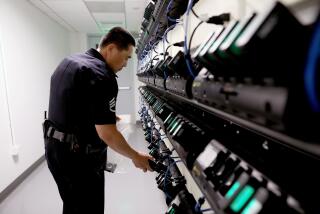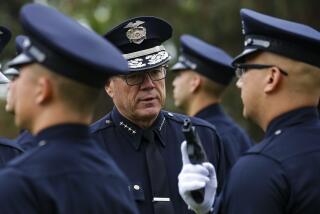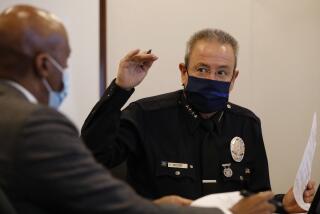Conversations are more effective for screening passengers, study finds
- Share via
Airport screeners are wasting their time trying to spot bad guys simply by checking out the body language of travelers.
That is the conclusion of a new report published by the American Psychological Assn. It said security agents are 20 times more successful at spotting deception when they question passengers than when they simply look for physical clues.
The study is significant because it supports a report by the Government Accountability Office last year that criticized airport screeners in the U.S. for relying primarily on “nonverbal indicators” to spot potential security threats.
In addition to full-body scanners and metal detectors, the Transportation Security Administration employs more than 3,000 so-called Behavior Detection Officers who try to spot bad guys at airports by their actions and verbal clues.
The TSA defends the program, saying both methods—observing passenger behavior and questioning them—are effective at spotting fliers with bad intentions. The agency said the work of the detection officers resulted in 118 arrests and 13 citations in 2013.
“Over the last several years, BDOs have demonstrated that these techniques are an effective means of identifying people engaged in deceptive and or illegal activity,” TSA administrator John Pistole told a congressional committee, in response to the GAO report last year.
The new research by professors at the University of Sussex and the University of Wolverhampton in England recruited 204 college acting students and undercover police detectives to try to get through eight European airports with mock cover stories.
In the study, security agents who got extra training in spotting deception through questioning caught liars 66% of the time, while officers who simply looked at physical clues, like fidgeting and lack of eye contact, only spotted deception 3% of the time.
“The suspicious-signs method almost completely fails in detecting deception,” said Thomas Ormerold, a researcher and head of the School of Psychology at the University of Sussex. “In addition, it costs a lot of money, absorbs a lot of time and gives people a false sense of security.”
To read more about travel, tourism and the airline industry, follow me on Twitter at @hugomartin.
More to Read
Inside the business of entertainment
The Wide Shot brings you news, analysis and insights on everything from streaming wars to production — and what it all means for the future.
You may occasionally receive promotional content from the Los Angeles Times.










